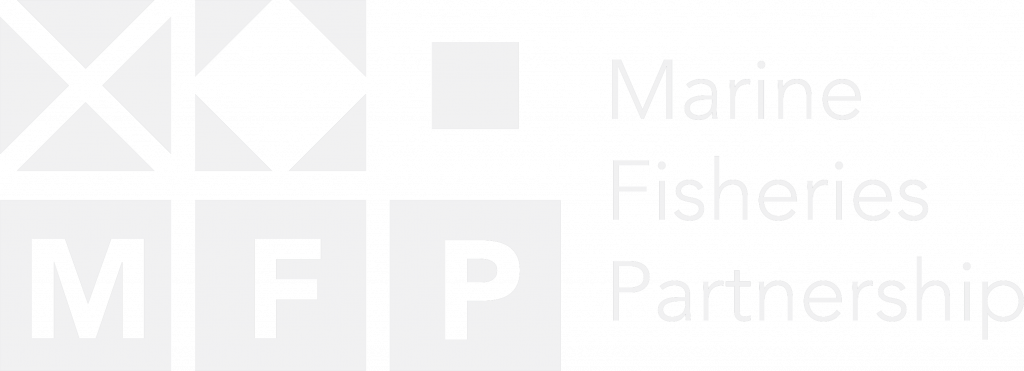University of Maine co-hosts the first International Young Leaders in Marine Research Webinar
April 29th, 2020
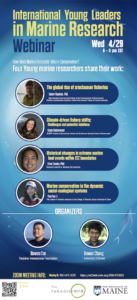
The Marine Fisheries Partnership continues to engage with scientists, scholars, and students in marine research across the world amidst the prolonged global quarantine. Partnering with the Paradise International Foundation, the University of Maine co-hosted the first-ever “International Young Leaders in Marine Research Webinar”.
The webinar was attended by participants from the US, China, Indonesia, and other countries. The four speakers of the first webinar of a series: Dr. Robert Boenish, Ms. Cayla Calderwood, Dr. Kisei Tanaka, and Ms. Yunzhou Li, likewise outlined their global visions on the future of marine science, research, and conservation.
MFP Co-hosts Side Meeting focused on TAC Progress in China
November 31, 2019
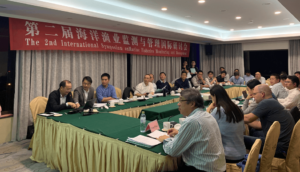
A thematic seminar on implementing total allowable catch (TAC) method in China’s fisheries management, hosted by staff and students from the University of Maine, accompanied the 2nd International Symposium on Marine Fisheries Monitoring and Management in Zhanjiang, Guangdong, China on December 1, 2019. The seminar was organized as a side-meeting to provide an opportunity for the update and discussion of the latest progress on implementing TAC pilots in different provinces and locations across China. During the side meeting, fisheries managers and scientists engaged in in-depth discussions about the progress, the present challenges, and the path forward to refine and to diversify China’s existing TAC programs.
The side meeting was a resounding success in terms of participation: more than 40
participants attended the meeting; even more students lined the hallway to listen in on the discussions. Fisheries experts, scientists, government officials, managers, members of NGOs all contributed to the discus
sions with their unique perspectives, knowledge, and visions. Five presenters of the side meeting were all directly involved in the development of the fishery management plans for TAC pilot programs across China’s coast, sharing with the group first-hand perspectives.
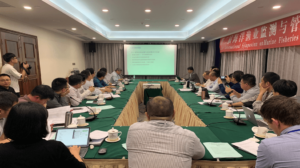 The presentations were followed by a Round table discussion, which centered around four thematic questions:
The presentations were followed by a Round table discussion, which centered around four thematic questions:
- What are the main impediments against implementing TAC in China?
- What are the most important lessons learned from the TAC pilots so far?
- What recommendations should guide the next phase of implementing TAC pilots in China?
- Where are future opportunities for exchange and collaborations on TAC implementations in China?
The side meeting reached the following key conclusions:
1. The TAC experiences in Zhejiang and Shanghai exhibit a higher degree of maturity and could be emulated by other provinces.
2. One such example is Zhejiang’s experience in effectively monitoring fisheries activities.
3. Providing the necessary legal provisions is key: currently, TACs in China are hampered by the lack of a clear legal basis for the creation and distribution of exclusive fishing rights.
4. Fisheries selected for TAC pilots matter. Selection should take into consideration the biological characteristics of the fisheries.
5. Data quality and availability are of fundamental importance to the success of TACs in China.
6. Stakeholder cooperation, co-management, and the formation of “social organs” in China’s fisheries sector will play an important role in TAC success.
The 2nd International Symposium on Marine Fisheries Monitoring and Management—main conference
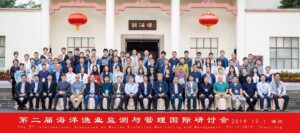 The 2nd International Symposium on Marine Fisheries Monitoring and Management took place at Guangdong Ocean University in Zhanjiang, China, from December 1st to December 3rd, 2020. The symposium was jointly hosted by the University of Maine Marine Fisheries Partnership (MFP), the Guangdong Ocean University, the Southern Laboratory for Marine Science and Engineering (Zhanjiang), the National Laboratory for Marine Science and Technology (Qingdao), the Ocean University of China, and the Yellow Sea Fisheries Research Institute.
The 2nd International Symposium on Marine Fisheries Monitoring and Management took place at Guangdong Ocean University in Zhanjiang, China, from December 1st to December 3rd, 2020. The symposium was jointly hosted by the University of Maine Marine Fisheries Partnership (MFP), the Guangdong Ocean University, the Southern Laboratory for Marine Science and Engineering (Zhanjiang), the National Laboratory for Marine Science and Technology (Qingdao), the Ocean University of China, and the Yellow Sea Fisheries Research Institute.
More than 100 scientists, experts, managers, and government officials, encompassing a broad range of backgrounds, attended the symposium, representing a comprehensive collection of key research institutes, universities, government divisions, NGOs, and enterprises engaged in fisheries science and management. The symposium included fourteen oral presentations and five poster presentations. Speakers shared their experiences and expertise on ways to answer some of the most pressing questions in fisheries policy, fisheries monitoring (both population and ecosystem monitoring), data collection methods, data sharing framework developments, cutting-edge fishery monitoring technologies, and other topics. The discussion sessions of the symposium further facilitated the exchange of innovative fisheries monitoring and management ideas amongst experts from not only different parts of China but all around the world.
Mr. Xiaomin Lin, the vice secretary of the Guangdong Ocean University, outlined the mission of the symposium: to promote the advancement of China’s fishery monitoring and management framework with inputs from Chinese and international scientists and experts.
The symposium was composed of four sessions, each moderated by Professor Yong Chen (University of Maine), Professor Yiping Ren (Ocean University of China), Professor Xiansen Li (Yellow Sea Fisheries Research Institute), and Professor Yunrong Yan (Guangdong Ocean University). Professor Yong Chen kicked off the symposium with his presentation titled “Develop online and meta-fisheries-environmental database to improve data transparency and quality control for fisheries management,” addressing a critical issue in China’s fisheries management. Professor Chen shared his experiences and recommendations on China’s fisheries data framework (including data collection, data processing, database building, and data quality control). Professor Yiping Ren’s presentation discussed how to improve coastal resource management by analyzing socioeconomic, ecological, and fisheries data as a whole. Peter Mous, the director of The Nature Conservancy’s Indonesia Fisheries Conservation Program, also presented at the symposium on edge-cutting technologies on electronic monitoring.
This year’s symposium marked the continuation and expansion of the first fisheries monitoring symposium held in Qingdao in 2018. A bigger and more diverse cast of participants invigorated discussions on fisheries monitoring. We are hopeful that the annual monitoring symposium will continue to expand, grow in influence, and play an essential part in promoting the sustainable development of China’s fisheries resources through science and collaborations.
Looking Towards the Next 5 Years: MFP Hosts China Policy Workshop in Orono, Maine
October 7-10, 2019 (Orono, Maine)
Overview
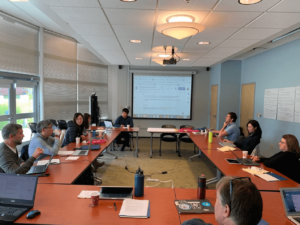 MFP hosted a workgroup meeting focused on China’s fisheries policy reforms from October 7 to October 10, 2019, on the campus of the University of Maine in Orono, ME. A working group composed of fishery experts, scientists, and graduate students from the United States and China who specialize in different related disciplines, encompassing policy, natural science, and social science fields. The objectives of the working group meetings are the following:
MFP hosted a workgroup meeting focused on China’s fisheries policy reforms from October 7 to October 10, 2019, on the campus of the University of Maine in Orono, ME. A working group composed of fishery experts, scientists, and graduate students from the United States and China who specialize in different related disciplines, encompassing policy, natural science, and social science fields. The objectives of the working group meetings are the following:
- Facilitate structured discussions to delineate the best current ideas on the future directions of China’s sustainable fisheries reforms.
- Draft outlines for a series of papers to provide an authoritative overview and encapsulate policy recommendations.
- Draft a timeline to guide future directions and opportunities for research collaborations, advocacy, and outreach.
The workshop was structured into three modules:
1) Diversifying management tools in China’s diverse fisheries;
2) Growing social organs of China’s fisheries management;
3) Strengthening science inputs in policymaking.
For each module, experts in attendance presented on a number of key topics of fisheries management and marine conservation. These topics include the progress towards sustainable fisheries management during China’s 13th Five-Year-Plan; the development of China’s marine protected areas; climate change adaptations in China’s fisheries; strategic conservation planning tools; fisheries subsidies in China; lessons from fisheries organizations around the world; and science input mechanisms in the US and EU’s fisheries management frameworks.
The presentations illustrated an enlightening and comprehensive collection of the most pressing topics on China’s fisheries management reforms today.
Additionally, as a part of the workshop, MFP organized field trips to the Darling Marine Center (DMC) and Maine Center for Coastal Fisheries (MCCF) to observe first-hand fisheries policy research being applied to on-the-ground actions. Working group members and researchers from the DMC and MCCF shared practical and engaging stories of research and management challenges. Participants learned about Maine’s fisheries management activities and gained inspirations for their own research going forward.
2018 New England Fisheries Management Study Tour
August 15, 2018
The 2018 New England Fisheries Management Study Tour took place between July 29 and August 2. With invitation from the United States National Oceanic and Atmospheric Administration (NOAA) Office of International Affairs, the study tour brought together a delegation of fisheries experts and policymakers from the United States and China. Participants came from international NGOs, academia, as well as government offices from both countries. The group not only toured various fishing towns and met with stakeholders involved in different sectors of New England’s fisheries, but also engaged in deep conversations with each other.
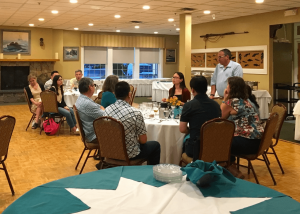
The study tour got off to a flying start with a dinner-time speech by former National Marine Fisheries Service (NMFS) northeast regional administrator Mr. Andrew Rosenberg, who is currently directing the Center for Science and Democracy at the Union of Concerned Scientists. Mr. Rosenberg’s speech resonated with the mission of the MFP. He expressed his optimism for non-governmental organizations and local organizations to bring in a different perspective to policy actions.
The New England Study Tour, in many ways, continues in the same vein as the 2017 Alaska Study Tour. The delegation visited various US federal fisheries management institutions, including the Greater Atlantic Regional Fisheries Office headquarters in Gloucester, Massachusetts.
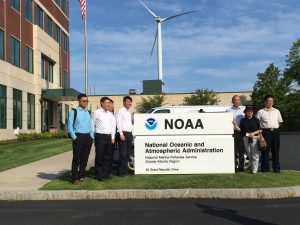
In Gloucester, the delegation met with the current regional administrator Mr. Michael Pentony, the executive director of the New England Fisheries Management Council Mr. Tom Nies, and many other officials and experts in charge of various aspects of New England’s fisheries management regime. The presenters introduced to our delegation the inclusive, transparent, and participatory fisheries management practices they’ve adopted in New England. Experts from the Chinese delegation also presented on their work in advancing output control fisheries management strategies back in China.
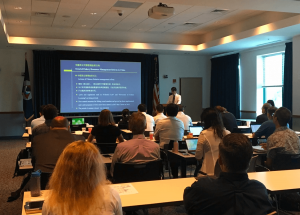
We also visited the headquarter of the Northeast Fisheries Science Center in Woods Hole, MA. There, both US and Chinese scientists presented their research in fisheries stock assessment, implementing ecosystem-based fisheries management, and many other topics of interest. The Chinese delegation even visited the Woods Hole Science Aquarium to observe how science is presented to the wider public.
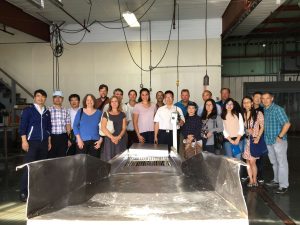
Even more so than during previous study tours, the New England Study Tour aimed to capture a comprehensive snapshot of the region’s entire fisheries landscape. The delegation ventured to step outside of the air-conditioned office buildings to meet with stakeholders working on the ground. This included a visit to the harbor front in New Bedford, MA. In New Bedford, the delegation visited a scallop auction house and a seafood processing plant to meet with both the owners and the workers who are playing an integral part in New England’s fisheries industry.
The delegation also visited stakeholders further removed from the major cities. In the quiet fishing town of Chatham, MA on Cape Cod, members of the delegations climbed the Chatham fishing pier to observe fishermen unloading the day’s catch. We spoke with retired fishermen who served as interpreters to the wealth of local history and fishing traditions of Cape Cod.
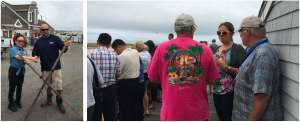
We later learned that part of the reason that we could still see so much of this local history, economy, and communit being preserved is because of the tireless work of the Cape Cod Commercial Fishermen’s Alliance, who welcomed us to their office with open arms. They explained to us their values, philosophies, and strategies.
Li Wei presenting China’s Fisheries Management at the University of Maine
September 28, 2018
It was a rather ordinary and characteristically overcast third weekend of September on the campus here at the University of Maine. Classes have begun for two weeks, but just as everything is seemingly falling into a monotonous tic-tac rhythm, the Chen lab offered a pleasing change of pace by receiving a distant visitor from China.
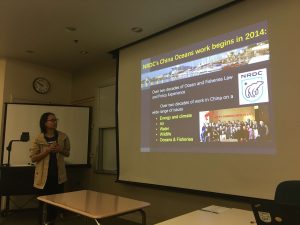
Mrs. Wei Li, the China Fisheries Policy Analyst from the Natural Resources Defense Council (NRDC), flew into Bangor, Maine from Beijing the night before to give us a crash course on the current state of China’s fisheries management.
In a room full of students, professors, and staff from the university, Wei captivated the audience by taking us on an informative journey to the distant world of China’s fisheries and fishing communities.
Wei pointed out some of the challenges that China faces today as well as the central government’s present effort to review the domestic fisheries law. She noted that the efficacy of China’s fisheries management could observe a remarkable improvement with better integration of fisheries science and policy.
Yet, despite the looming challenges that remain, Wei’s talk effused optimism. She observed the Chinese government’s dawning consensus of the importance of conservation over unrestrained utilization of the marine environment. As a part of the “green reform” inscribed in China’s 13th Five-year Plan, the government has shown swift and sincere efforts to develop and adopt innovative management measures, such as the introduction of TAC, improved catch monitoring, and reduced total fishing capacity.
Wei’s talk at the University of Maine signifies another step in the MFP’s efforts to facilitate communication between fisheries managers across the Pacific. Mrs. Wei Li, and our partner NGO NRDC, brings to the table years of experiences working in China advising policy and capacity-building. For the first time, we had the opportunity to directly hear from them about their extensive, meaningful work.

